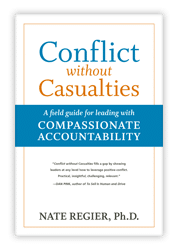
Is your 360 preventing you from doing a 180?
Share viaGetting accurate feedback about performance and behavior is difficult. Self-report is notoriously biased. Reports from supervisors often miss important perspectives from peers, co-workers, or clients. Thus the 360; a “full circle” assessment that includes feedback from multiple angles. Usually conducted in the context of an annual performance review, the 360 supposedly offers a more comprehensive and accurate assessment of a person’s performance. Most 360 evaluations are conducted anonymously, and the employee receives only aggregate feedback. Rarely do such evaluations involve direct conversations between the person being rated and those doing the ratings. Often the supervisor or HR will “interpret” the results.
Advantages of a 360
- Feedback from multiple angles gives a more thorough picture
- Peers, employees or customers may report unrecognized performance gaps
- Can improve accuracy of self-perception
Disadvantages of a 360
- Replaces daily conversations around performance and behavior
- Avoids necessary conflict between people who rely on each other every day
- Delays important conversations about behavior
- Turns conflict into a number instead of a conversation
- Gives people a mechanism to feel justified instead of taking personal responsibility
- Prevents us from doing a 180 and reflecting on our own behavior
Getting feedback from all angles is absolutely necessary. Doing it once a year in an indirect way that avoids conflict is drama.
What would you gain if you taught people to practice healthy conflict instead of filling out surveys about each other?
- Just in time conversations about today’s behavior
- Healthy conflict that promotes higher levels of accountability
- More trust and commitment to the team
- More clarity and responsibility around how my behavior contributes to, or detracts from, the team goals
- Knowing we are worthwhile, curious, and consistent
Conflict is the gap between what I want and what I am experiencing at any given point in time. That gap is neither good nor bad, but it does generate energy. Using that energy to have regular, healthy conflict with each other is the best way to keep yourself, your team, and your company on the right track.
How to have daily conversations about performance and behavior
- Share how you are feeling about the gap, without accusing anyone
- Explain the gap between what you want and what you are experiencing
- Identify what’s most important to you. What are the boundaries or principles at stake?
- Check in with the other person to gain their perspective
- Repeat if necessary to gain their buy-in for struggling together towards a solution
Learn how to use conflict as a daily source of energy for positive change
Get the book that started the Compassionate Accountability revolution
Book Your Next Keynote Speaker

Author and Co-founder of Next Element, Dr. Nate Regier is available to speak at your upcoming event.
Submit a Speaker RequestPodcast: Listen to Nate "On Compassion"
 Listen to the Podcast
Listen to the Podcast



0 Comments
Add comment